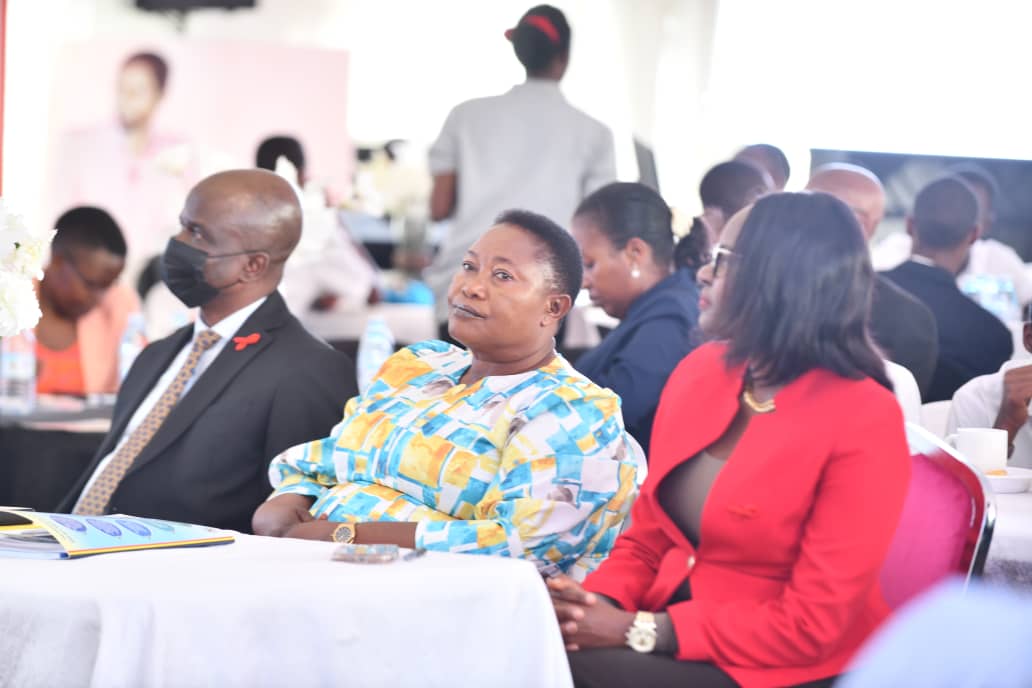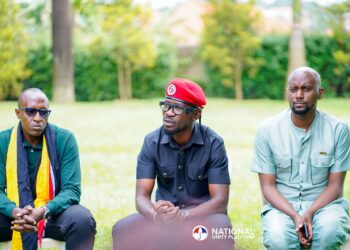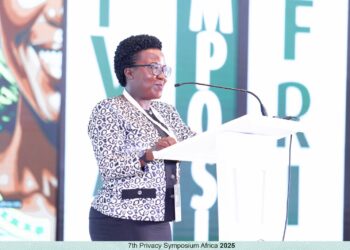The Minister for Presidency, Hon. Babirye Milly Babalanda, has urged Ugandans to combine efforts in fighting HIV and AIDS during the closure of the 3-day National HIV and AIDS Symposium 2025, under the theme, “Building a Sustainable HIV Response to End AIDS”, held at Mbarara University of Science and Technology in memory of the legendary Philly Bongole Lutaaya
Minister Babalanda extended warm appreciation to the development partners, the Government of Uganda and the Uganda AIDS Commission, under the able leadership of the Chairperson and the Director General, for organising this successful and well-coordinated symposium and asked them to work together to meet the goal of ending HIV/AIDS.
“I also thank the Vice-Chancellor, management and student leadership of Mbarara University for hosting this great and memorable event. I thank all the stakeholders, government institutions, development partners, civil society, researchers, health workers, people living with HIV, and the youth whose active participation has enriched the discussions and outcomes of this year’s Symposium,” she added
“Over the past three days, I have been informed of your engagement in deep and constructive dialogue. You have reflected on the achievements made in the past five years of the National HIV and AIDS Strategic Plan and launched the new Plan 2025/26–2029/30, which will guide Uganda’s efforts towards ending AIDS as a public health threat by 2030,” the minister said.
The minister also noted the country’s progress in the national HIV response in the last financial year, which also marked the end of the National HIV and AIDS Strategic Plan.
“As highlighted in the Joint AIDS Review report, our country has made remarkable progress. HIV prevalence has dropped from 18% in the early 1990s to 4.9% today. New HIV infections have fallen by more than 60% since 2010. AIDS-related deaths have declined by 63%. 94% of people living with HIV are aware of their status, of which 90% are on treatment, and 97% are virally suppressed. This is good progress towards the UNAIDS 95-95-95 targets.”

“These are not mere statistics; they represent millions of lives saved, families preserved, and communities strengthened. This progress reflects the unwavering political commitment of the Government of Uganda, the visionary leadership of His Excellency, President Rtd Gen. Yoweri Kaguta Museveni, and the active engagement of all partners in the multi-sectoral response. Uganda’s approach, anchored in strong coordination, community involvement, and evidence-based interventions, continues to be a model for the region and beyond,” she said.
Minister Babalanda also informed the participants that young people, especially young women, continue to account for a significant proportion of new infections. Stigma and discrimination persist in some communities, undermining access to services and support.
“We must therefore strengthen our efforts to reach those who are most vulnerable and ensure that no one is left behind in the national HIV response.”
Uganda, therefore, faces an urgent call to transition toward sustainable, domestically driven financing of the HIV response.
The minister also noted that the government is committed to domestic resource mobilisation, as emphasised in the HIV Sustainability Roadmap, as donors withdraw from funding most of the programmes.

“This means integrating HIV financing into national and local government budgets, identifying innovative funding sources from within the Government, and tapping into innovative financing models that draw on community and private sector engagement. However, ending AIDS by 2030 will require not just more resources but smarter use of available resources with efficiency, transparency, and accountability at every level,” she said.
The minister hailed the researchers in the role of fighting HIV and AIDS.
“Uganda has provided ground for successful scientific innovations, including the 6-monthly injectable PrEP, which will soon be rolled out in the country with support from the Global Fund. HIV remains a unique disease because it has no cure; we therefore need to support the scientists and researchers in the quest for an HIV cure. Let’s embrace the findings and innovations from the scientists as we continue searching for a cure for HIV.”
“As a government, we pledge to continue supporting research and innovation as a pillar of our HIV response, ensuring that policies and interventions are guided by evidence and that our young researchers are nurtured to become the next generation of public health leaders.”
“As we close this symposium in commemoration of Philly Bongole Lutaaya for the courage and advocacy he exhibited, we carry on his legacy and fight stigma among the people living with HIV/AIDS,” she said.
“When Philly Bongole Lutaaya declared his HIV-positive status more than three decades ago, he gave the epidemic a human face. He broke the silence, fought stigma, and inspired a national movement for compassion and awareness.”
“As we commemorate his legacy, let us renew our determination to eliminate stigma and discrimination in all forms. Every Ugandan living with HIV deserves dignity, inclusion, and equal opportunity to live a healthy and fulfilling life. Let us honour Philly Lutaaya not just in music, but through action by ensuring that our workplaces, schools, and communities are free from stigma.”
“Distinguished participants, as we close this symposium, I want to commend the Uganda AIDS Commission for its leadership and coordination; the Ministry of Health for the technical leadership; Mbarara University of Science and Technology for being an excellent host and for championing innovation; and all our development partners for the support and solidarity, the private sector, community-based organisations, and the media for your unwavering commitment to this cause.”
We must also empower communities and civil society to continue their vital work at the grassroots level. It is in our villages, schools, health facilities, and homes where the battle against HIV is truly fought and where victory will ultimately be won.
The minister called upon all leaders, political, cultural, and religious, to continue being voices of truth, promoting messages of prevention, care, and non-discrimination. The HIV response is not just a medical issue; it is a human development and social justice issue that touches every family, every community, and every sector of our nation.
“As we close this year’s National HIV and AIDS Symposium, let us leave here inspired and reenergised. Let us turn the commitments we have made into concrete actions. Let us strengthen coordination, increase investments, and amplify community voices. Together, we can ensure that by 2030, AIDS will no longer be a public health threat in Uganda.”
This year’s World AIDS Day will be held on 1st December at Kizinda Town Council, Bushenyi District.
The event was also attended by Right Rev. Bishop Sheldon Mwesigwa, Chairperson and Board of the Uganda AIDS Commission, the UN Resident Representative, the Director General, Uganda AIDS Commission, area leaders and others
Do you have a story in your community or an opinion to share with us: Email us at editorial@watchdoguganda.com













